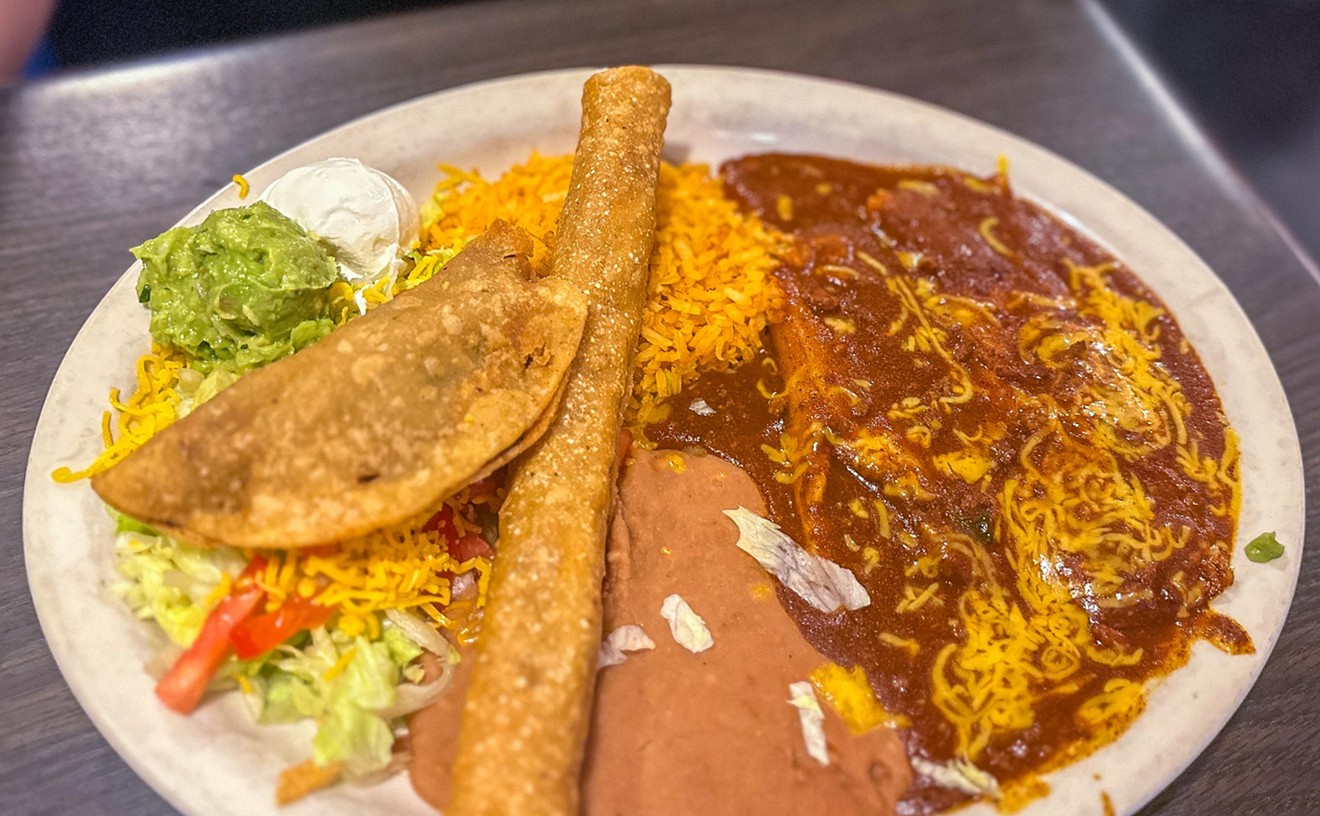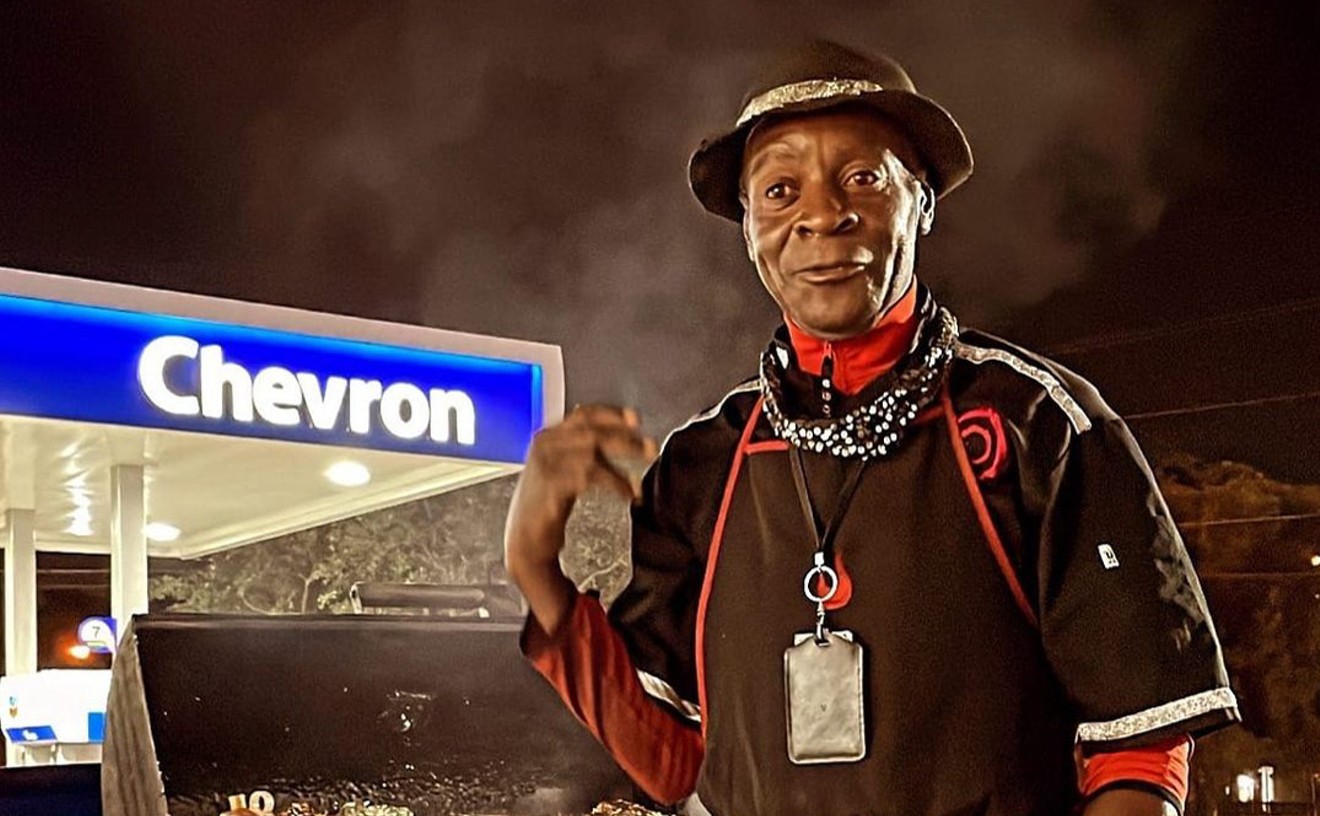Soon enough, people begin convincing themselves Days of Thunder is "vintage early Cruise," Armageddon "could have been worse," Beverly Hills Cop II is "Eddie Murphy's underrated masterpiece," Will Patton is an actor to be reckoned with, Con Air and The Rock and Gone in Sixty Seconds are things Nicolas Cage should be proud of, and Flashdance and Top Gun are to the 1980s what La Grande Illusion and Aleksandr Nevsky were to the 1930s. Shortly after that, people stop breathing.
Somewhere in the middle of Coyote Ugly--likely, between the scenes in which John Goodman lands in the hospital and Piper Perabo dances on a bar with LeAnn Rimes--cinematic flat-lining set in. At a screening at the AMC Glen Lakes, you could sense something happening in the audience, a transformation taking place: The laughs, once forced and empty (the free-movie audience, gratified for 90 minutes of gratis air-conditioning in July, will chuckle at anything), were becoming cold and automatic; by the end, the crowd sounded like human cash registers, opening and closing and opening again.
Fifteen minutes into this protracted, 90-minute trailer (Bruckheimer, as has often been said, makes commercials, not movies), I blacked out; the blood trickling out of my nose signaled an impending aneurysm, which actually started coming on during the final half hour of Gone in Sixty Seconds. Soon enough, I stopped taking notes and writing down quotes ("Violet, I saw how hard it was on your mom when she didn't make it"), and began jotting down a will. Presumably, my body will completely give out during a screening of Remember the Titans, the Wildcats-meets-Malcolm X rah-rah football film Bruckheimer's due to open later this summer. I want to make sure my affairs are in order.
In this barren wasteland of a cinematic summer, when even the most dreadful detritus makes millions opening weekend (Nutty Professor II: The Klumps, The Perfect Storm, X-Men, Loser, What Lies Beneath, Hollow Man, Road Trip--it is an infinite, insensible list), Coyote Ugly ranks highest among the lowlifes. The movie--think Cocktail-meets-Flashdance--is essentially soft-core porn made by men too cowardly to go all the way; one friend suggests the name Cocktease. Piper Peekaboo keeps wanting to strip to her thong, but the camera pulls back and ducks for cover, until the tease become lascivious. The movie wasn't filmed; it was leered. It's set in an actual Manhattan bar where supermodel bartenders entertain drunken patrons by two-stepping on the bar, guzzling booze straight from the bottle (how very oral sex of them), and pouring pitchers of water on themselves for no apparent reason other than it makes them get all...wet. Bruckheimer no doubt is the kind of guy who looks at a bucket of ice and gets a hard-on; the man is shameless and, of course, mind-numbingly rich for it.
To recount the plot is to admit there is one; then again, any movie that begins with two versions of "I Will Survive" and ends with LeAnn Rimes singing a Dianne Warren song on the bar of the Coyote Ugly is worth recounting, if only because no one will believe it otherwise. It begins as all Bruckheimer movies do, in a grimy suburbia (South Amboy, New Jersey, in this case) where American flags dangle from houses 365 days a year. Violet Sanford (Perabo, who is to acting what Carrot Top is to comedy) is leaving her dad (John Goodman, the most watchable thing in a movie full of half-clad hotties) to move to New York City, a mere 42 miles away--which doesn't stop Dad and his baby from tearing up as she speeds away to Manhattan.
Violet dreams of becoming a songwriter, just as her mother did before she returned to Jersey, defeated--or so Violet thinks, until Daddy sets her straight at film's end. (Oh, did I just give something away? Dude, seriously.) She sits in her shitty apartment, "writes" and "sings" her shitty songs (penned by Diane Warren, who is to songwriting what Mussolini was to world peace, and performed by Rimes on the soundtrack) that have such titles as "Can't Fight the Moonlight" and "The Right Kind of Wrong," and begins schlepping them around New York in hopes of finding a publisher and an agent.
One night, she mistakes a fry cook named Kevin (Australian-born Adam Garcia, who once played Tony Manero in the London stage production of Saturday Night Fever) for a club's booking agent, and he plays along. When she discovers the truth about his deception, she can't help but fall in love--even though he spends thousands of dollars collecting comic books ("This is the first appearance of The Punisher!") and plays fishmonger on the side. Seeing as how her songwriting career's going nowhere--she's too stage-frightened to even perform in front of half a dozen drunks at an open-mike night, which is, admittedly, a fate worse than death or Coyote Ugly--she winds up in an all-night diner where three would-be hookers (Izabella Miko, Bridget Moynahan, and Tyra Banks) count their night's booty. Violet discovers from the fry cook (a haggard Bud Cort, languishing in obscurity all these years later) that they're not pros at all, but Coyotes--waitresses at Manhattan's hippest hot spot, run by Lil (Maria Bello, ex of ER), who has whiskey on the rocks running through her veins. (Banks, it should be noted, has little more than a cameo, and as an actor, she's an excellent supermodel.)
Soon enough, the shrinking Violet is hopping on the bar, strutting her stuffed bra, singing along with Blondie songs to quiet riotous crowds, and getting her picture in the pages of The Village Voice, much to the disgust of her beleaguered, toll-booth-working papa. Dad, eventually, lands in the hospital after getting hit by a car on the job, forcing a wet, weepy reconciliation between father and daughter. But the inevitable happy ending is turned up to 11: Not only does Violet get her shot on stage, backed by a house band at the Bowery Ballroom, but LeAnn Rimes winds up turning her song into a hit single.
For a split second, and no doubt by accident, Bruckheimer, first-time director David McNally (a veteran of Budweiser ads, but of course), and rookie screenwriter Gina Wendkos (who wrote Wiseguy episodes, and presumably the post-Ken Wahl ones) sabotage their movie. Kevin rails at Violet for working at the bar, insisting it's nothing but a would-be titty bar where the bartenders shake their asses for spare change; he's right, and Violet knows it, looking not a little ashamed for having confused empowerment (a word that appears more often in the press kit than punctuation marks) with employment at what's essentially a seedy strip club where girls keep their tops on, and just barely. But the lone real, honest moment is fleeting, a tangent discarded and drowned out by EMF's "Unbelievable," which shows up on the soundtrack so often, it's likely Bruckheimer owes that defunct band some money. Go see Coyote Ugly, and you'll feel as though he owes you eight bucks too.










